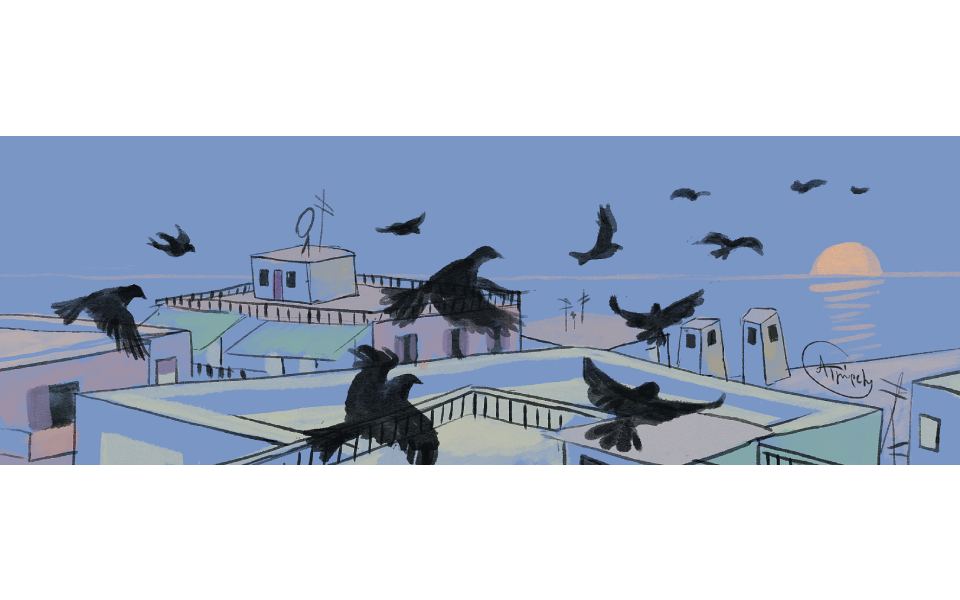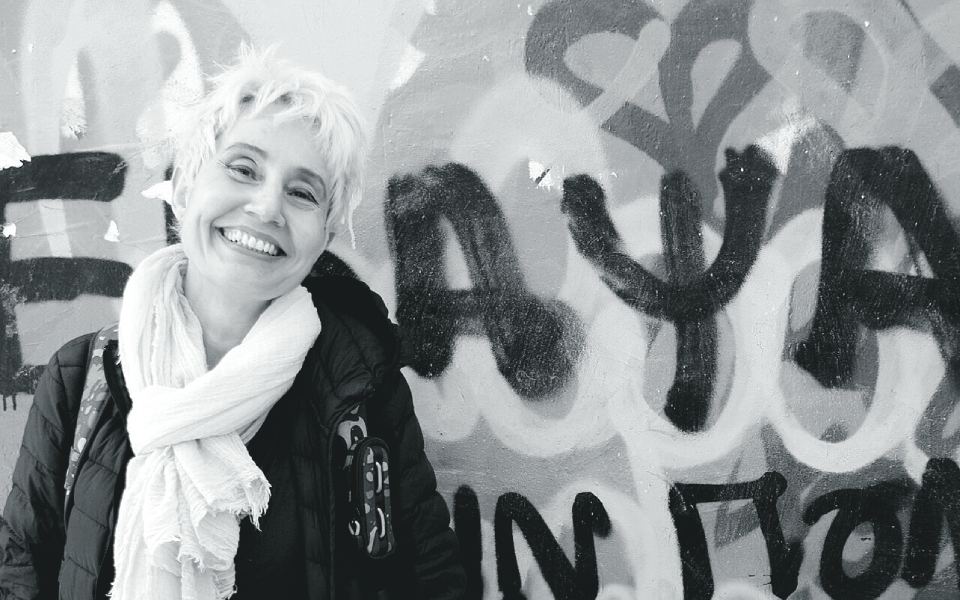AGHIOU DIMITRIOU, DOWNTOWN
His name is Niko. He was a good student in middle school, but by high school it got boring. He can’t stand his mother’s yelling. He waits for her rant to stop; he’s timed them, and they rarely last for more than 10 minutes.
She’s been barging into his room, too, these past two days, unfazed by the closed door. She spends afternoons on the internet, looking for instructions for her son’s online classes and then pestering him.
“I told you I’m not doing it,” Niko shouts from his room.
“You have to,” she insists. “They’re taking roll call!”
And she keeps calling the other mothers.
Later, she goes for a walk with Dad.
“Want to come?” she asks the boy.
“With you? Never!” Niko yells from his bedroom.
She spends forty minutes on the cellphone, more or less, as she walks with her husband down the big road. When they get near the hospital, she switches to the sidewalk on the other side of the street. Her husband asks why; she believes that some things do not require explanations. The parents head out again in the evening. This time, Niko puts on his shoes.
“I’ll come,” he says, throwing on a hoody. Mom smiles and walks ahead; her son and his father follow, lagging back. The street is dark, deserted. From a distance they’re like three cowboys slouching along in the Wild West.
AETORACHIS, FALIRO
Lena is watching a teleconference on the screen. The camera and microphone are off. She’s in her pajamas, lying in bed; the weather is terrible. She’d love to put on some music and dance. The spreadsheets they’re presenting make her yawn. Her daughter is fast asleep in the next room, her cellphone right by her pillow and the teaching plat form running as she pretends to be part of the class.
Later, in the kitchen, Lena downloads the exercises sent by her daughter’s teachers and browses the web for their solutions; she knows how to find what she’s looking for. She copies the answers to the physics and the Ancient Greek questions first, then the others; all seven classes, copy-paste. They’ve even assigned some written homework for Phys Ed and she plans to do that, too. Dina watches her with eyes still heavy with sleep.“Why do you bother?” she asks. “Don’t humor them.”
Lena makes fried eggs and potatoes. The TV stays on and they eat slowly; they’re not fighting today. Outside the window, the street is quiet. As they clear the table, Dina rushes into her arms and kisses her as she did back when she was a little girl and loved her mother more.
“The only teacher I’d get up at eight o’clock for is Kralidis,” Dina says. “Don’t even try waking me up for anyone else.”

© Illustration: Anna Tzortzi
KERASOUNTOS, KALAMARIA
She was baptized Neratzoula, after her grandmother, but goes by Julia. She teaches literature. Her mother has dementia. She’s hired a Ukrainian lady to look after her. Finding someone was hard, but her mother is all she’s got. That makes her cry sometimes. She loves her job, despite what others say. The prospect of her looming retirement fills her with dread.
She has spent days at the computer, trying to figure out how the teaching platform works. She’s read the instructions, made hundreds of mistakes and started over again and again. Now she’s writing out exercises, correcting papers and sending messages to her students, adding the emojis they like.
The Ukrainian lady calls; there’s trouble with her mom, who’s yelling, demanding to go out. Julia stops by her mother’s house every day, texting the code 4 (“move to help people in need”) to the civil protection authority number as required and then walking through the park to Sourmenon Street. She’s a wreck by the time she gets back home. She knows that she’s doing what needs to be done and tells herself to stop thinking about it. She pours a glass of wine, eats some rice from the fridge. She talks to her plants on the balcony. Books offer no solace; all she wants is to watch TV. She judges people not by the messages they send, but by whether they actually call.
KARAOLI & DIMITRIOU, EVOSMOS
It hadn’t been this hard when the twins were babies. Even when they cried, demanding either food or a diaper change and always at the same time, she found a way to make it work. They’re 14 years old now and she often feels like a tightrope walker. As soon as one thing is done, another needs her attention. Holed up at home, she always thinks the worst, but is grateful when it doesn’t happen. Tonight, it’s Friday evening and the girls’ cellphones keep pinging with incoming emails. Their teachers are sending homework. The girls complained at first; then they ran out steam, tired of griping, and surrendered. The teachers set deadlines. “Why are you getting involved?” her husband asked. “It’s up to them to get it done.”
“I’m their mother; I can’t just leave them to it.” Little did she know. She sits beside them to help with the geography homework, biting her lip when she sees the questions. The teacher asks about the pandemic and the European Union. How did each country react (“See the links”)? How did the situation evolve in each country (“Look at the charts”)? What do the students see as the best approach to the pandemic (“In essay form”)? She sits up writing until 11 at night. Goodness knows what the 14-year-olds would have answered. “Where’s the remote?” she asks her husband when she finally finishes. “Isn’t there anything mindless on? Something stupid, a comedy, anything? Oh, and get me a scotch.”

© Illustration: Anna Tzortzi
PAVLOU MELA, ORAIOKASTRO
“Miss,
I’ve been thinking about you and really wanted to send an email, but couldn’t think of a good reason, so I kept putting it off. Now that I think about it, though, the best reason to do something is because you want to, isn’t it? I still don’t have anything very good, or very clever, or interesting to say. I just wanted to say that I miss you and I want all this to be over soon.
I hope you’re well – health, health, health! And air kisses, as my grandmother says, so we don’t catch anything. I send you a couple of those, too.
I guess you’ve figured that the lockdown is making me a bit crazy, so I’ll stop because, if I go on, you’ll definitely end up with a migraine.
I wanted to thank you personally for the optimism you inspire, even when I feel desperate. I have learned so much these past few days that will stick with me and, as you like to say, that I will tell my children someday. Miss, I never thought I’d say this, but I miss school. When we go back, I’ll never complain again – yes, me, who complained all the time!
Oh, I just remembered: I think I saw you on Aghia Sofia Street the other day. It was Friday or Saturday night, but you were walking very fast, and I couldn’t catch up. I regret not walking a bit faster.
WHEN THE CITY REOPENS…
…And we get our lives back,
When we can touch each other again,
When all this is over,
Niko will go to a soccer game at Toumba and shout until his throat is raw,
His mom will go to Peraia to walk barefoot in the sand,
His dad will enjoy a glass of tsipouro at the small taverna in front of the Rotunda,
Lena will go to her favorite movie theater,
Dina will meet her friends at their usual spot on Navarino Square,
Julia will finally get to the gym,
The twins’ mom will go to the Georgian restaurant she likes so much,
The twins will hang out on the pedestrianized street nearby,
The student will go downtown to sit on the low wall outside the Church of Aghia Sofia,
And her favorite teacher will spend a weekend on the slopes of Mt Holomondas, in the little house in the forest.
They will embrace their city; they will have stories and memories.
And one day Niko will say: “Thessaloniki, man, it’s my city. It’s sitting on the steps of Ano Poli having a beer on a Saturday night. It’s dirty, but it’s alive – and I like it.”

ABOUT THE AUTHOR
SOPHIA NIKOLAIDOU has published stories, essays, scholarly work on literature and creative writing, and translations. Since 2019, she has taught Creative Writing at the Aristotle University of Thessaloniki. Her 2015 book “Good Today Too” won a Special State Literary Award. Her latest work is titled “The Golden Bracelet.”












